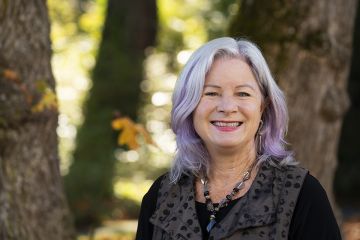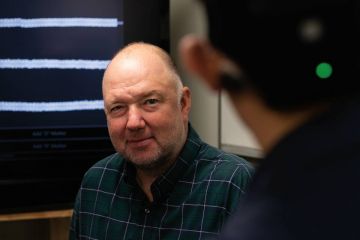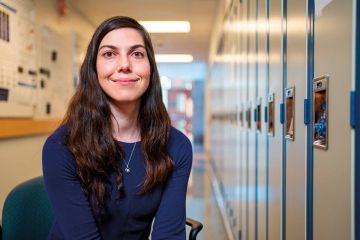Singing to fight the stigma and social isolation of dementia
Human and Social Development, Social Sciences
- Suzanne Ahearne
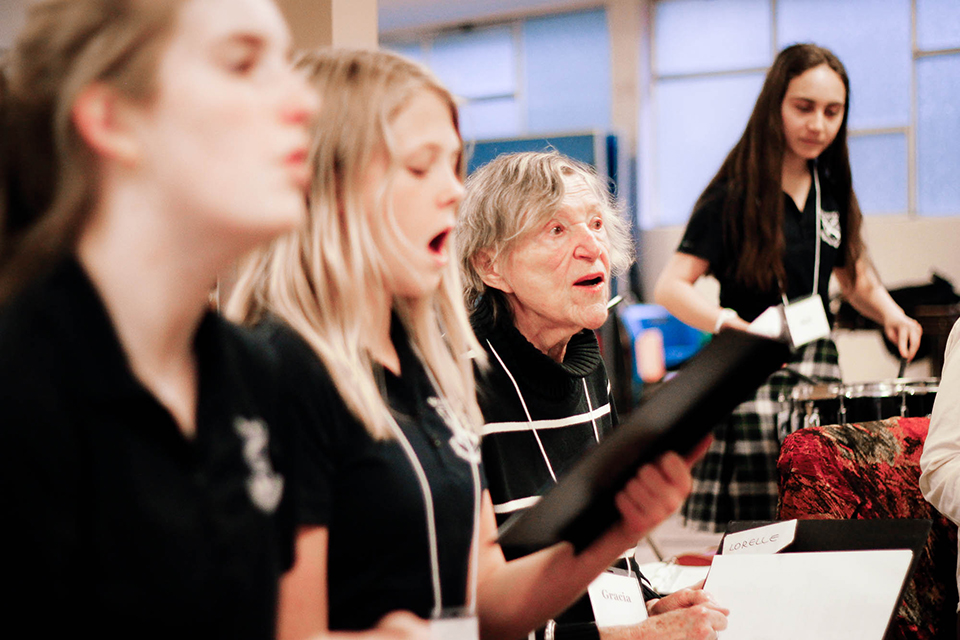
The Second World War was young and Rita Goodman was nine years old when she first started singing about bluebirds flying over the white cliffs of Dover and the long, long road to Tipperary.
In her earliest memories of the songs, she was huddled in the darkened basement of the Liverpool orphanage where she grew up, being led in song by nuns who taught their young charges to sing to drown out the sounds of the German Luftwaffe as bombers pummelled the British port city.
Now, at 88, in the basement hall of St. Joseph’s church in Victoria, Goodman is singing the same songs with her daughter Anne and about 30 others, as part of "Voices in Motion," an intergenerational community choir for persons with dementia, their family caregivers and a group of high school students. Her short-term memory is what she calls "sketchy'" but when she sings a medley of the British morale-boosting songs made famous by Vera Lynn, her memories of those war years are as vivid as they ever were.
Voices in Motion is also a two-year University of Victoria research study led by Debra Sheets (nursing), along with fellow research affiliates of UVic's Institute on Aging and Lifelong Health—Stuart MacDonald (psychology) and Andre Smith (sociology)—along with Mary Kennedy (music) and Carl Asche (economics) at the University of Illinois College of Medicine at Peoria. They’re investigating how participation in this type of choir impacts quality of life for persons with dementia, caregiver well-being, how it reduces some of the stigma surrounding memory loss.
Intergenerational knowledge-sharing
Goodman, who worked as a registered nurse in Britain and Canada and sang in the UVic Chorus for nearly 40 years, was sitting beside St. Andrew’s Regional High School student Chanel Mandap when choral director Erica Phare-Berg asked choir members to chat with their neighbours for a few minutes after singing the medley. She tells Mandap about the nightly ritual of little girls in nightgowns being trotted downstairs to sleep in the basement during air raids and of the storage shelves they converted into makeshift beds.
“We sang our little hearts out as the bombs were falling,” Goodman tells her, and they both laugh. Mandap tells her she’s never heard anything like this in her history classes.
This kind of knowledge-sharing doesn’t come as a surprise to Sheets. “Intergenerational choirs are really magical,” she says after the practice. “People tend to associate with people their own age. For older adults to be around younger people who have a lot of good energy, and for younger people to be around older people when maybe they don't live near their grandparents, they can develop relationships with them and care about them.”
This is going to be especially important, she points out, in a population where the number of older adults is going to double in the next 15 years.
Studying the impacts on lives and relationships
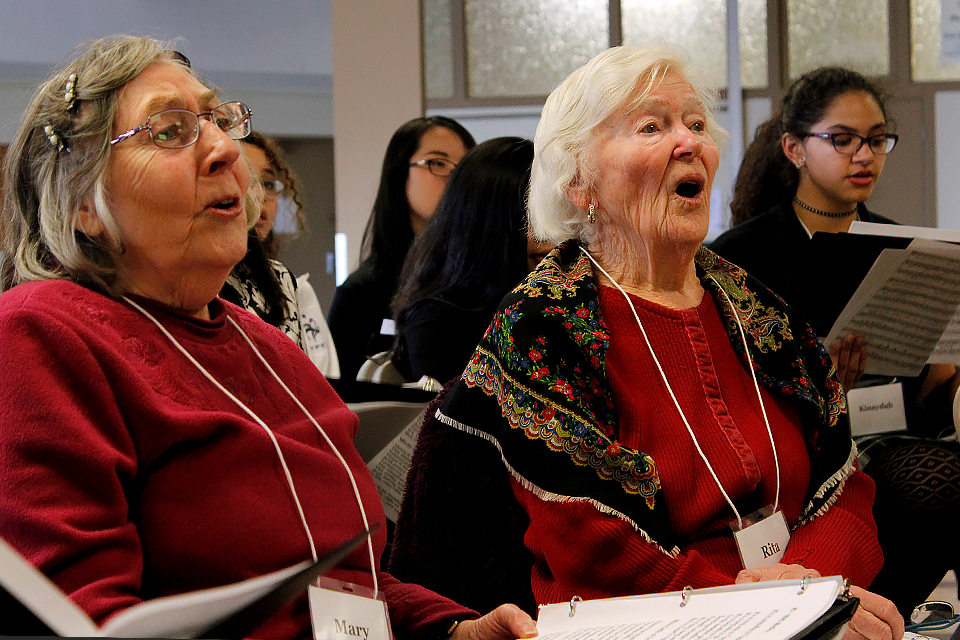
There have been a few small studies on choirs for people living with dementia, but Sheets says that to date they have been primarily qualitative and largely just asked participants about their experience of the choir without tapping into the impact on their lives and relationships. This choir is also unique in involving high school students as well as caregivers.
“More rigorous research is really important,” says Sheets, because although choirs are a relatively inexpensive intervention, they’re not without expense: they require a choir director, piano accompanist, a place to rehearse and other supports. “To gain wider public support for dementia-friendly choirs, we need stronger evidence that this can significantly improve people's health and well-being,” she says.
To gather the necessary data, participant pairs—a person with early- to moderate-stage dementia and a family caregiver who’s most often a spouse or child—go through four assessments as part of the 14-week study. They’re doing rigorous cognitive, neuropsychological and physiological assessments.
Alison Darnley is a fourth-year honours psychology student who’s volunteering with the project to do some of the physiological tests measuring gait on a special pressure-sensitive mat. She wanted to add to the research she’s doing with Stuart MacDonald exploring gait as a marker of cognitive decline. The idea is to identify people early on who may benefit from interventions to slow down the trajectory of decline.
Mary Kennedy, emeritus UVic music professor, is leading the high school students survey portion of the study asking about their attitudes and knowledge about dementia before and at the end of the project.
Sociologist André Smith is working with graduate student researchers to do in-home interviews with participant pairs about the choir’s impact on social networks and the relationship between persons with dementia, their caregivers and the student.
Researchers hope that the project’s findings and tools will allow other organizations to replicate best practices and measure the impact of a choir on social connections, caregiver burden and stress, social networks.
“Our goal,” says Sheets, “is to offer an opportunity to participate in a meaningful and supportive activity in which having dementia is not the focus. It’s not about staying busy and filling time. It’s about doing something that leaves you feeling uplifted and which offers opportunities to learn by being part of a community that values your voice and what you’re contributing to the group.”
“I think if we can have an impact on quality of life here for both the caregiver and care recipient so that both experience the potential for learning and creating new social connections with others that reduces stigma and isolation than this is a great contribution,” says Sheets.”
At the end of the first phase of this two-year project, the choir put on a sold-out public performance on May 2. In September, two choirs of 30-40 choir participants each will run concurrently.
The project is funded by the Alzheimer’s Society Research Program and Pacific Alzheimer Research Foundation. Island Health is the project’s community collaborator.
Photos
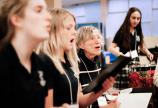
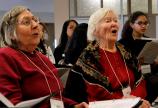
In this story
Keywords: dementia, mental health, health, research, nursing, psychology, brain, community, music, sociology, Institute on Aging and Lifelong Health
People: Debra Sheets, Stuart MacDonald, Andre Smith
Publication: The Ring


